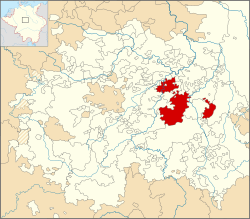Saxe-Eisenberg
Appearance
You can help expand this article with text translated from the corresponding article in German. (July 2012) Click [show] for important translation instructions.
|
This article needs additional citations for verification. (March 2017) |
Duchy of Saxe-Eisenberg Herzogtum Sachsen-Eisenberg (German) | |||||||||
|---|---|---|---|---|---|---|---|---|---|
| 1680–1707 | |||||||||
 | |||||||||
| Status | State of the Holy Roman Empire | ||||||||
| Capital | Eisenberg | ||||||||
| Government | Principality | ||||||||
| Historical era | Middle Ages | ||||||||
• Partitioned from Saxe-Gotha | 1680 | ||||||||
• Extinction of line | 1707 | ||||||||
| |||||||||
The Duchy of Saxe-Eisenberg was one of the Saxon Duchies held by the Ernestine line of the House of Wettin.
History
[edit]Established in 1680 for Christian, fifth son of Ernest I, Duke of Saxe-Gotha, the Duchy consisted of Eisenberg and the towns of Ronneburg, Roda and Camburg. Upon his death in April 1707, as he had no male heirs, the lands were passed to Saxe-Hildburghausen.[1][2]
Dukes of Saxe-Eisenberg
[edit]References
[edit]Citations
[edit]- ^ a b Michael 2016, p. 651.
- ^ Foster 1989, p. 76.
Books
[edit]- Foster, Joseph (1989). The Dictionary of Heraldry: Feudal Coats of Arms and Pedigrees. London: Bracken Books. ISBN 9781851703098.
- Michael, Thomas (2016). Standard Catalog of World Coins, 1701-1800. F+W Media, Inc. ISBN 9781440247064.

